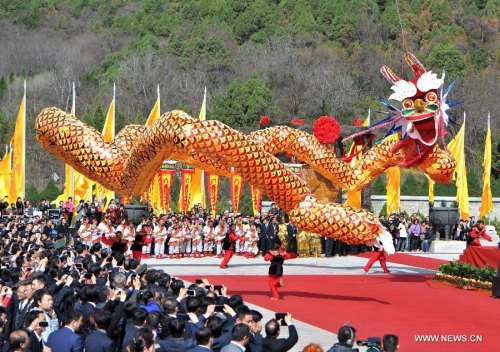
A ceremony is held to honor Huangdi, or the Yellow Emperor, who is considered as the ancestor of the Chinese nation, on Qingming Festival in Huangling County, northwest China's Shaanxi Province, April 5, 2015. (Xinhua/Ding Haitao)
Chinese people traditionally sweep the tombs of their ancestors on Qingming Festival, which falls on April 5 this year. But some overseas Chinese have few clues as to who their ancestors even were.
Lie Huihan used to be one of them. Growing up in the Dutch countryside, Lie often wondered why his appearance was different from that of the other children around him.
His family followed the Chinese traditions of eating longevity noodles during birthdays and sweeping the family tomb during Qingming Festival, but his parents and grandparents do not speak Chinese and have never been to China.
Lie grew curious about his Chinese roots and started tracing his family tree after graduating from college in 2003. He found a distant relative from his mother's side and learned where his ancestors came from.
In 2008, he took his mother to the village near Zhangzhou City, Fujian Province in southeastern China, where they toured old houses and an ancestry temple with their "distant-distant" relatives.
"I had a sense of being connected when I walked around in the small village, where the ancestors of my mother lived about seven generations ago," said the 36-year-old Lie.
Lie's great-great-great-grandfather moved from China to Indonesia in the 1840s to seek better economic opportunities, and his grandfather moved to the Netherlands, Indonesia's former colonizer, in the 1950s.
Lie said his personal experience inspired him to start his own business to help overseas Chinese learn more about their ancestry. He explained that, compared with well-established genealogy services in the West, there was an untapped opportunity to research family history for the fifty million overseas Chinese living in Southeast Asia, Australia, North America and elsewhere.
His own company, My China Roots, was founded in 2012 and is located in an office at the Temple of Earth Park near the Lama Temple in Beijing.
"We help you trace your ancestry, put your roots in context, and visit your ancestral village in China," the company website claims.
Lie has served over thirty clients, most of whom were referred through word of mouth or online.
He first asks his client to provide as much information as possible, then searches online and contacts local overseas Chinese affairs offices in addition to gathering historical materials to locate a client's ancestral village.
Lie and his assistants generally make a trip to the village, trace any leads they can find, and talk to locals for more information while documenting the research process. The time for each project ranges from several weeks to six months. "It's just like being a detective," said Lie.
"It's a combination of big historical events and a personal history," said Lie, who compiles the materials into a report so clients can have a detailed picture of who their ancestors were.
"Sometimes you just learn history from books, but you find it has no connection with yourself personally," he said.
For example, Lie said, following the First Opium War in the 1840s, five treaty ports opened along the southeastern coast of China, providing an opportunity for Chinese to do business in Southeast Asia, where many later immigrated.
"Finding your roots will make history come 'alive' and you know which historical events impacted your ancestors' lives," Lie added.
He said he finds joy in helping others find fulfillment. A U.S. client once provided him an old photograph, which was shot in front of a house when his grandfather's family left China about sixty years ago. Lie and his assistant found the very house in a village in Kaiping, Guangdong Province.
The client went to the house. "He stood in front of it holding the photograph in his hand with tears in his eyes. I was deeply moved at that moment," said Lie's assistant, Hai Miao.
Not everybody has been so fortunate. Once his team arrived in the suburbs of Fuzhou City, capital of Fujian Province, only to find that the village they were looking for had been turned into an economic development zone full of factory buildings and wide roads.
Lie said the best thing about his job is that every project is unique, no matter the results. With each project, they find unexpected facts and stories.
Lie said that sometimes his work is like a race against time. Old houses, ancestral temples and even entire villages have disappeared in the wave of urbanization and modernization. Older generations tend to be the guardians of family and village history while younger people move to big cities.
Now a group of young people is helping Lie to discover the Chinese roots of his clients. They are mainly from the provinces of Guangdong and Fujian, to which many overseas Chinese trace their heritage.
"To some extent, for the young, it is a process of finding their roots," said Lie.
















































